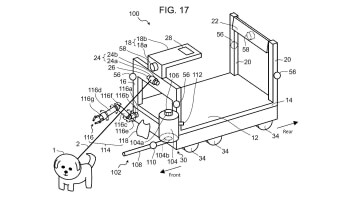On Monday, I had the privilege of being the expert guest for News Tak Radio in San Diego on 600 A.M. KONGO News. To listen to the broadcase, visit:
The topic of discussion is one that’s very near and dear to me: the so-called “weird patents” that are increasingly filling the news, driving internet discussion, scrutiny, and in some cases fury from Wired.com to Twitter.
So why so many weird patents lately?

In my role as a patent attorney, I’ve noticed a sharp increase in the proliferation of “weird” patents in the last several years. When I started out in this profession 25 years ago, there was no such thing as the show Shark Tank. If you were talking about a shark tank, you were probably relating your latest visit to SeaWorld or using the term as a metaphor for a law office. Only the most hardcore of the hardcore geeks and nerds in a given field knew or cared about most patents until months or even years after they’d already been filed and approved, and their observations rarely if ever made it to the stage where they got the general public stirred up.
What changed and why are people watching patents so closely now?
Well—there are a lot of reasons.
First, more people are keeping tabs on what major tech companies like Google, Amazon, and Facebook are up to, either out of interest, out of concern, or out of actual fear that the dystopian future these people envision from our corporate overlords will come about sooner rather than later if they don’t. To be fair, there are some eyebrow-raising ideas with USPTO approval, like the Amazon delivery blimp which the IoT giant seems to have no intention of using. The entire purpose of a patent like this is to keep others from doing something similar enough to resemble Amazon’s patent without having to pay royalties or risk hostile legal action. Similarly, patents like these could be used to attract the attention of investors. If your IP portfolio is 80% vanity patents that support under 20% of your overall business, and 20% gold that fuels over 80% of your operations, having 1,000 patents becomes a very smart business move, for reasons we’re going to look at more closely in a minute.
In their most basic form, patents are supposed to offer solutions to problems. Some patents are flagrantly misrepresented or misunderstood by the press or the general public to generate clicks and steer public sentiment, such as the supposedly “lie-detecting” throat tattoo patented by Motorola.

Spoiler: It’s just an electronics-impregnated tattoo that is supposed to allow for clearer speech in loud settings like stadiums and noisy restaurants because of its placement on the human body. While hearing someone you’re talking to more clearly on the phone can help you suss out a lie, it’s unlikely that someone’s neck tattoo is going to function like a mood ring to help you pinpoint the lie. And even if it does, just knowing there’s A lie is pointless without being able to figure out what THE lie is. Seems like a bit of a design flaw, doesn’t it?
The problem with patent stories like these is that they’re almost inevitably sensationalized or misrepresented to the point of nonsense. However, since relatively few people ever bother to review the original patent documents, and even fewer have the skill or knowledge to properly decipher what the documents and supporting drawings articulate, the story of that patent becomes a game of telephone. By the time it filters down to the latest rage-Tweeter, the patent’s actual purpose, intent, and specs have been overshadowed by the negative press associated with it. One notable recent example was a cage designed to keep Amazon warehouse workers safe from being injured by robotic arms in the building. Ultimately, Amazon just went with a lightweight vest that deactivates machinery when a worker is nearby—a much better, more cost-effective, and less dystopian option!

But then there’s the REALLY weird ones.
Take the Toyota patent for a self-guided dog-walking platform, for example. The owner can ride along, and the machine detects when a dog poops and picks up the mess, or sprays down the area when a dog pees to dilute the urine and help prevent damage to lawns. This robot was the focus of our interview, and it’s notable for two reasons: first, because Toyota seems like a very unlikely entrant into the high-stakes world of picking up dog muck to begin with. Second, robotic pooper scoopers are hardly a new idea—like the Beetl, which works similarly to a yard-based Roomba for cleaning up after Fido. While this lesser-known iteration of Jetsons-style tech isn’t on the market yet, there are reports that the company that’s working on the Beetl is considering adding a lawnmower function to it.

In the interview, I expressed some skepticism as to whether the Beetl, or the Toyota version, are likely to see the open market.
Very few people are likely to shell out big bucks for an automated pooper scooper when they can buy a hand-powered one for $20 at their local pet store, or assuming they have children, simply send one of them out with a plastic bag in hand. But people actually buy lawnmowers, and the dual functionality of a lawnmowing/poop-scooping machine would make this a more reasonable investment for many people. The obvious sticking point, then, would be the price the market will bear for the convenience it offers.
So why would Toyota aim at a weird patent geared to a market that’s so totally dissociated from their usual customer base?
The answer, as I said earlier, probably lies in the idea that “If I already own this idea, no one else can use it without paying me.” Just because Toyota has no intention of actually manufacturing or marketing this product doesn’t mean they can’t reap a handsome payday from someone else doing the same thing—and Toyota’s legal war chest for defending its IP rights is much larger than Beetl’s. Likewise, just because this specific innovation never sees daylight doesn’t mean that other elements or aspects of its design might not be practical, or profitable, for the company and the larger market.
Another possibility, and one that’s often overlooked, is that the design in toto may not be practical now, for whatever reason, but could be in the near future, bringing the production cost down to a point the market can tolerate after the profit markup. With a 20-year lifespan on a patent, that secures a lot of new horizons for a company to explore without fear of competition or market dilution, and a huge stockpile of potentially lucrative innovations and products that can be deployed largely at the company’s whim.

Why won’t the Toyota dog-walking platform make it to the open market?

John Rizvi is a Registered and Board Certified Patent Attorney, Adjunct Professor of Intellectual Property Law, best-selling author, and featured speaker on topics of interest to inventors and entrepreneurs (including TEDx).
His books include “Escaping the Gray” and “Think and Grow Rich for Inventors” and have won critical acclaim including an endorsement from Kevin Harrington, one of the original sharks on the hit TV show – Shark Tank, responsible for the successful launch of over 500 prodWucts resulting in more than $5 billion in sales worldwide. You can learn more about Professor Rizvi his patent law practice at www.ThePatentProfessor.com
Follow Professor Rizvi on Social Media:
YouTube: https://www.youtube.com/c/thepatentprofessor
Facebook: https://business.facebook.com/patentprofessor/
Twitter: https://twitter.com/ThePatentProf
Instagram: https://www.instagram.com/thepatentprofessor/
I’ve helped hundreds of inventors successfully prosecute their patent applications, from initial filing to final award and look forward to helping you with your new idea.



